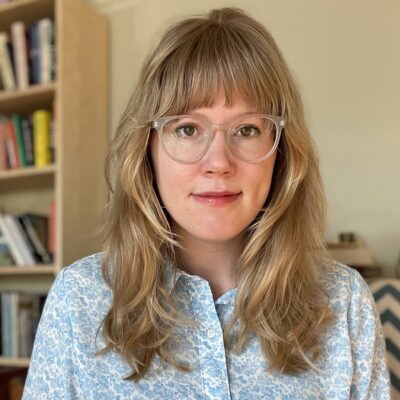Student Spotlight: Susannah Sharpless

September 16, 2024
Susannah Sharpless is a doctoral candidate in English language and literature from Indianapolis, Indiana. She earned her bachelor’s degree from Princeton University and now studies 19th century American literature with a focus on women writers and the sea under the guidance of Shirley Samuels at Cornell.
What is your area of research and why is it important?
I study 19th century American literature and focus on women writers. I’m especially interested in the influence of the sea on the lives of women from a variety of racial and ethnic backgrounds. During the 19th century, the ocean was thought to be dominated by men and male writers, but in my research I have found that many women were preoccupied with the effects of maritime trade and travel on their lives. I hope that by drawing out these stories, my work will allow literary scholars to tell a wider story about the influence of the ocean on American literature.
What are the larger implications of this research?
In a time of climate catastrophe, it’s clear that rectifying the exploitative relationship between humans and the environment isn’t only a scientific question – it’s a question that means looking closely at the ways we think about ourselves and organize our world. By including women in the history of what it means to live on a “terraqueous globe,” to use Herman Melville’s phrase, I hope we will better understand how completely each and every one of us relies on the natural world for physical safety, intellectual growth, and emotional well-being.
What does it mean to you to have received the Deanne Gebell Gitner ’66 and Family Annual Prize for Teaching Assistants?
I work hard to inspire and motivate my students to think deeply about language, and it is truly validating to have those efforts recognized. Young people today are asked to navigate overwhelming pressures, anxieties, and distractions, and I believe quite passionately that humanistic inquiry is one of the most important tools they have at their disposal. Teaching them to develop those skills is hard – and rewarding – work, and I am grateful to be recognized for my labor.
What did this award allow you to do that you might not have been able to otherwise?
Beyond the material support, which is dearly appreciated, this award has helped me feel more hopeful about my career aspirations to become a teacher. It also has helped me spend more of my summer working on my dissertation and developing my syllabus for next year’s class, which I can’t wait to start teaching!
What are your hobbies or interests outside of your research or scholarship?
I love reading and writing poetry. I also love to be outside – hiking, paddle-boarding, running, or biking – which I am careful to balance out with a healthy amount of TV and the occasional Skyrim binge.
Why did you choose Cornell to pursue your degree?
Cornell’s reputation as a serious literary program appealed to me, and I was excited about the chance to work with the brilliant professors in the Literatures in English Department. I felt the program offered a flexibility that played into my interdisciplinary background (I studied religion and creative writing in college) and I was excited about the freedom to push disciplinary limits as I developed my dissertation project.
